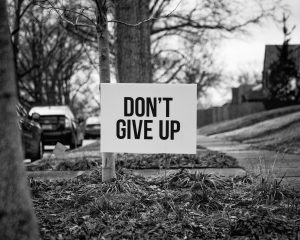
Defying the odds, taking a stand and owning your life
This has been a year like no other. It has no doubt tested every ounce

It can be quite challenging starting up a new company. There are many things to consider and at times, you will experience both excitement and nervousness as you embark on this journey. Your heart tells you that it is the right thing to do but your head keeps reminding you about the many pitfalls you are bound to land in. The combination of both fear and uncertainty of the future makes it a tough choice and certainly not for the faint hearted. Having successfully run my company for a good 12 years, I can tell you that it is no easy feat. Do I regret it? NO!. Would I have started it if I had my life to live over again……absolutely YES!
It has been one of the most amazing adventures of my life. I have learnt and grown as an individual in leaps and bounds. The wealth of knowledge I have been privileged at uncovering has been phenomenal. It has removed my blinkers and given me a new appreciation for Accountants, Marketers, IT Technicians, General Managers , not to mention working copiers, printers and wireless connections. I often think back to the early days I started. I had the fortunate privilege of having an entrepreneurial husband who had run his own business for 20 years and identified with my best friends, trepidation and anxiety. His support and encouragement was instrumental in crafting my future and my determination to succeed.
Over the years, many people have asked me for advice on how to start up and run a company. I am certainly no expert and gosh, have I made mistakes!…it’s pretty much trial and error starting out. You don’t know what you don’t know. Everything seems vaque, foreign and complex. Some days you wake up excited and ready to take on the world, other days you cant help asking yourself “what was I thinking?”. This is completely normal. Small businesses require a different set of skills, innovation, entrepreneurship, resilience, persistence, faith and a belief in oneself. You cannot start a new venture without the will to succeed. Starting up a business is not just about complying with certain rules and conditions, It is also about being mindful of the reasons as to why you are embarking on this journey, the drivers behind your decision, the goals, both personal and professional that you are setting for yourself and most importantly, the impacts of this decision.
When you start a business based on passion and purpose, making money is by default. When you start a business to make money, you can easily lose sight of your passion and purpose.
I have often heard people say, “is it true that you make a lot more money running your own business then working for a boss.?” The objective of running your own business should be to pursue something you love doing. Of course, you want to make money but money doesn’t last without will and passion. Money will follow when you have heart in what you do. Remember that if you starting a business, you doing so to last a lifetime, unless you are making a conscious decision to give it up at some stage, but even then, it must be worth something. Starting a business takes deliberation, effort and commitment. It takes delicate planning, thought, a vision for the future and the desire to see it through, no matter how rough it gets. There is a strong differentiator between building a business and working for your business. Whilst you may start off your business having made many sacrifices, you must aim to get to a position where your business works for you.
The business should be the vehicle you use to drive your purpose and your passion and equally so, rewards you for your innovation. The skill you need to start a business, is not the same skill you need to stay in business. The trick is to see yourself as an investor in your business and not as an employee. If you continue to see yourself as an employee, you have not transitioned your business to start working for you, you are still very much a “worker” and not a business owner.
I thought that it would be a good idea to share some of my learnings over the years as much of it has shaped my journey and continues to guide every decision I make:-
Focus – you cannot be all things to all people. Focus on what it is you want to achieve through your company and build your solutions and value around this. When you are good at the one thing you sell, you gain credibility. People believe in you, in your brand, in what you have to offer. They no longer buy your product, they buy your company’s capability.
Originality – there are many products on the shelf. What is unique about yours? Originality sells. I don’t want to buy what everyone else has. My problem is unique, my situation is different. I don’t want to be put in a box labeled “one size fits all” How is my supplier shaping my journey to enrich my business in such a way that it speaks directly to my challenges? I don’t want to be told that everyone is using the same system, or the same product. I want to use it because it works for me not for everyone. Best practice does not always mean best fit.
Robust – build an company on solid foundations which is accompanied by strong values, principles, methodologies and expertise. The approach used in any deal with a client must offer cutting edge techniques, global thinking, a competitive lens and a holistic approach’s to addressing their challenges. A robust approach means that your company considers business continuity planning as top of mind, is not self reliant on a single person, hedges their risks against key man dependencies and is strong and healthy to stand up against competitors, rivals and masters in the game.
Client Centred – the client is at the centre of everything we do. We wouldn’t have a business if we did not have a client to sell our products to. It’s a simple rule but often not followed – we don’t know what our clients need until we ask the question. “What is it that you need? “How can we help address your challenges.? Often the approach is telling our clients what we can do rather than understanding what it is they need us to do.
Ethical – in the years that I have run my own company, I have walked away from numerous business because it did no resonate with my values. Ethics is not built on short term transactions, ethics is built on long-term relationships. When you value life, people and purpose, you see the world through different eyes.
These key principles represented by the word FORCE are easy to remember and will certainly add to sound decision making when embarking on your journey to set up and run your own business.
It is important to remember that small businesses are the heart of our economy. They inject longevity, sustainability and continuity. They create a platform for innovation, flexibility, change and opportunity. They are the foundations of economic prosperity, consumer choice, and competitive advantage. If this is your dream, pursue it, drive it and make it work for you
Until our next connect session.
Thank you for sharing.
Nimee, a Master HR professional has seen how these principles when applied, can improve business and personal challenges.
Over the years, Nimee has helped coach and mentor many people from all walks of life. She has a deep passion for life, for learning and for seizing every moment. She has led many organisations to create healthy workplaces, align business and individual values and generate a culture of inclusivity and aspiration. Through her professional exposures, Nimee has been able to share this learning with many individuals, guiding them through personal crises, showing them the importance of vision and direction in their lives and working with them to craft workable and practical strategies to get their lives on track. Nimee is an advocate for self-leadership and this is a common theme that is prevalent in all her teachings.

This has been a year like no other. It has no doubt tested every ounce

We all have opinions about the Will Smith and Chris Rock saga. It’s often

It’s been a long few months with many challenges faced, not just for us, but

Talent retention is a real challenge and employees are looking for organizations that inspire them,

The world is changing at a rapid pace and certainty is a thing of the